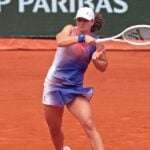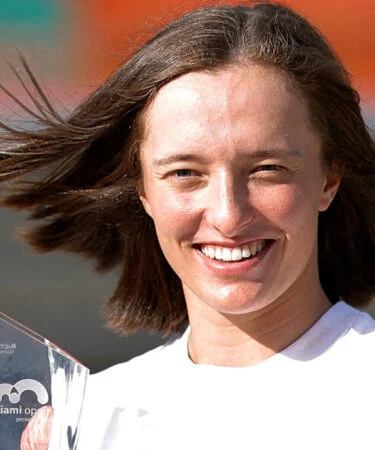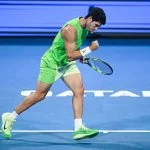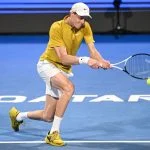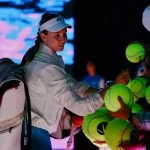Daria Abramowicz: “I am so proud of her, because it was so hard”
As Iga Świątek clinched her fourth trophy at Roland-Garros and so her fifth Grand Slam title, we asked her sports psychologist, Daria Abramowicz, to open the window a bit into the Swiatek’s version of the champion’s mindset.
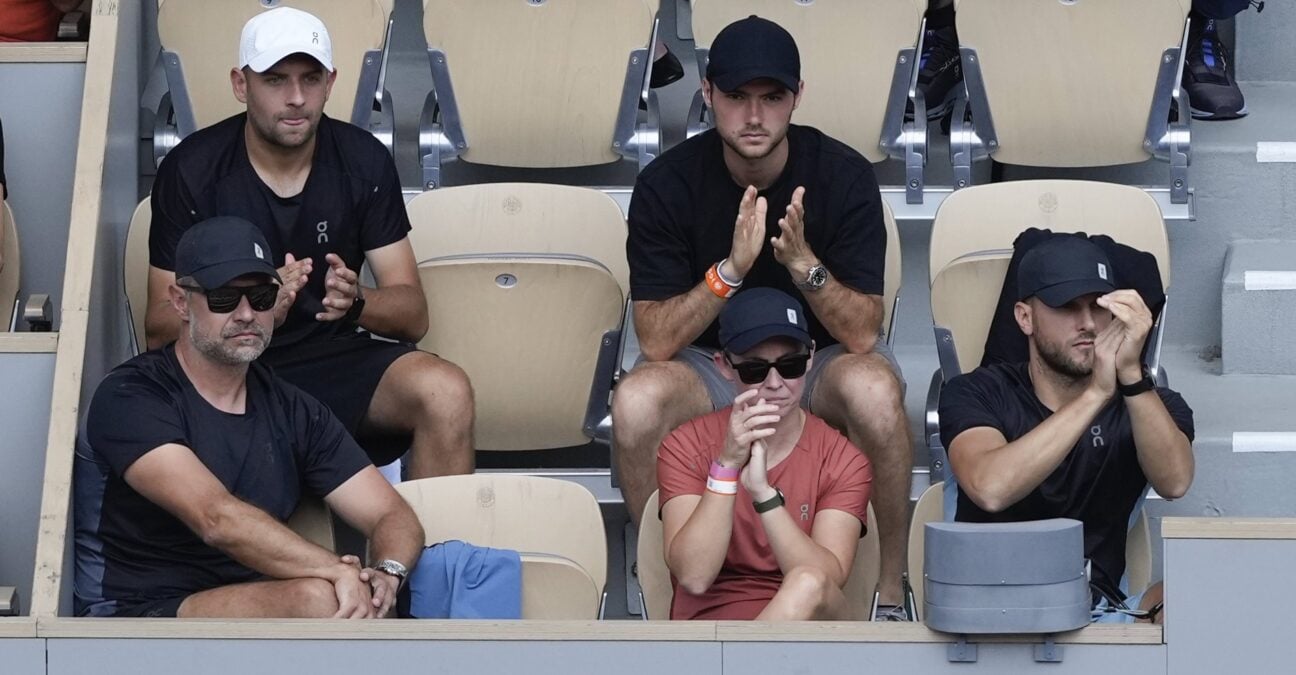 Daria Abramowicz, in red, watching Iga Swiatek’s triumph in Paris (© Thibault Camus/AP/SIPA)
Daria Abramowicz, in red, watching Iga Swiatek’s triumph in Paris (© Thibault Camus/AP/SIPA)
Daria Abramowicz can smile and relax a bit now that Iga Swiatek finished the job. Madrid – Rome – Roland-Garros : a performance for the ages. Case closed. Some people are going to shrug and say that Swiatek’s margin is so big on clay right now that of course she was going to win. Of course, she was always going to win because she’s just so good, right? It makes Abramowicz roll her eyes. There’s no “of course” at this level, even less when everybody says in circles that you cannot lose. No, it wasn’t a walk in the park to win that fourth Roland-Garros title. Not at all.
“Everyone was giving her the trophy after Rome already. Then again here when Arena and Elena lost. Which is tough,” Abramowicz told us at the player’s café after the win. “You can stay in your zone, focused and disciplined, but it will come to you day after day. You will listen to it and see it.”
So how did Iga still find a way through that pressure from outside? “The key was: being close to yourself, remembering what you wanted to do, keeping your standards high and your expectations low. I am proud of her, because it was so hard. From that perspective, I’m 100% sure it’ll empower her.”
“keeping your standards high and your expectations low”
Empowering Iga Swiatek has been the daily job of Abramowicz, and the mental work done with the very emotional World No.1 keeps paying off. Swiatek came back from the brink against Naomi Osaka, the same way she did against Aryna Sabalenka in Madrid. We tend to call it the champion’s mindset: these athletes are special and will repeat crazy escapes and wins on the edge. Swiatek clinching a fifth Grand Slam title at 23, four at Roland-Garros and keeping also a strong hand on the rest of the Tour is a performance that shouldn’t be underestimated by the margin she has on the rest of the field. So what does Abramowicz think: can that mindset be built through training or is Swiatek so special? A bit of both.
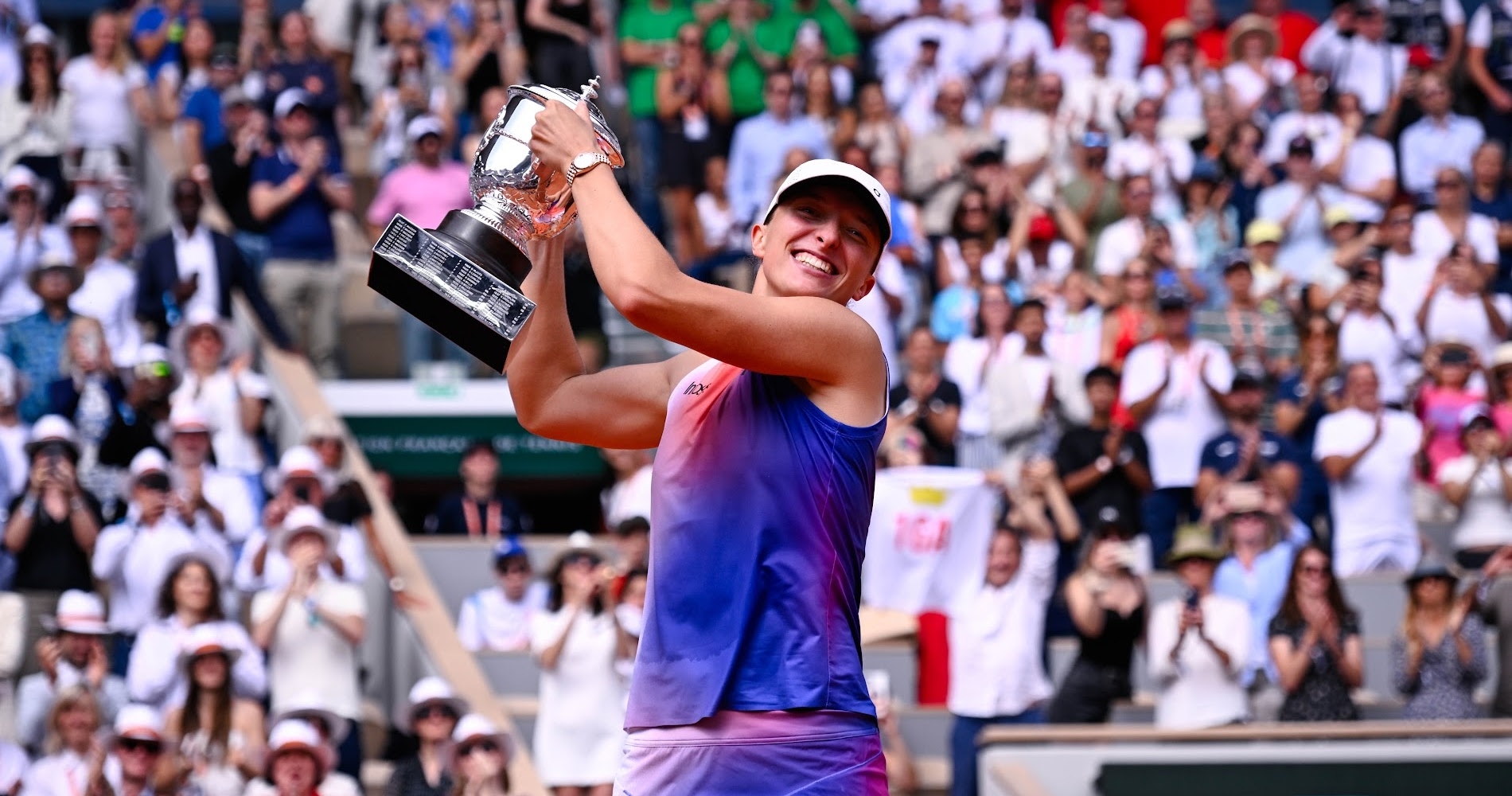
“There are some qualities that are extremely helpful in terms of building high performance, champions’ performances,” she said. “But even in solitary sports like tennis, there is a team. In psychology, we have something which is called environmental mastery and I do think that this is essential. There’s an athlete who is in that social network, and as important and essential to creating these legendary champions mindset is, there’s also this environmental mastery that our team is responsible for.”
Discipline as compass
Environmental mastery in psychology is defined as the capacity to manage one’s life and surrounding world effectively. It’s a tough ask indeed for a team but Swiatek’s one has proved at Roland-Garros again that they could deal with whatever is surrounding their player as long as needed for her to shine. In this way, they also absorb a lot of that external pressure.
So, indeed, you can train a champion’s mindset? “Absolutely,” says Abramowicz. As everything Swiatek related, the tool box is a mix of pragmatism and human nature knowledge. “Sometimes, technology helps us with a data-driven approach. We try to put all the pieces of the puzzle together. We have a data-driven approach in terms of the body and nervous system, tension, stress. We have also observations: Iga’s subjective feelings, thoughts and beliefs that are affecting the process, and sometimes in a bigger manner than data.”
Yet, they also need to count on the x factor. “We can have data in perfect order and still see a player who was playing great at the warm-up, suddenly choking when the match starts. We need to combine this. We can train this in a very modern way, helping ourselves with the technology, but also talking, digging deep, working on beliefs, on thoughts, refocusing, reaffirming, identifying emotions, using mindfulness to stay here and now, using mental training tools. In this modern world, with the pressure, tension, social media, external expectations, business side of things: we just cannot avoid digging deep. It’s psychology in sports, whatever the strategies.”
“sometimes people are making fun of us in the players’ box because we’re not smiling”
Champions of Swiatek’s level are special because they keep repeat the impossible. They don’t win once, they win all the time whatever the context. Their normal life is winning, while losses have become a rare annoyance. People will then call them machines. Yet, Swiatek is no machine: she’s probably the most emotional player of that top 10. Asked if she can see clear signs through matches of the mental work done with Swiatek, Abramowicz answers a resounding yes.
“I can see so many things in every single point. Sally Jenkins, in the book The Right Call, wrote this one sentence that stuck with me forever: ‘Discipline means freedom,’ so if you ask me one thing I see: it’s discipline. But not like living in a bubble, because it’s unhealthy. But in a constructive way, in terms of sticking to routines when it’s necessary, enjoying life but when we work we work. I know that sometimes people are making fun of us in the player’s box because we’re not smiling but this is what our player expects us to do as well: focus on the work and then we’ll enjoy and have something to celebrate.”
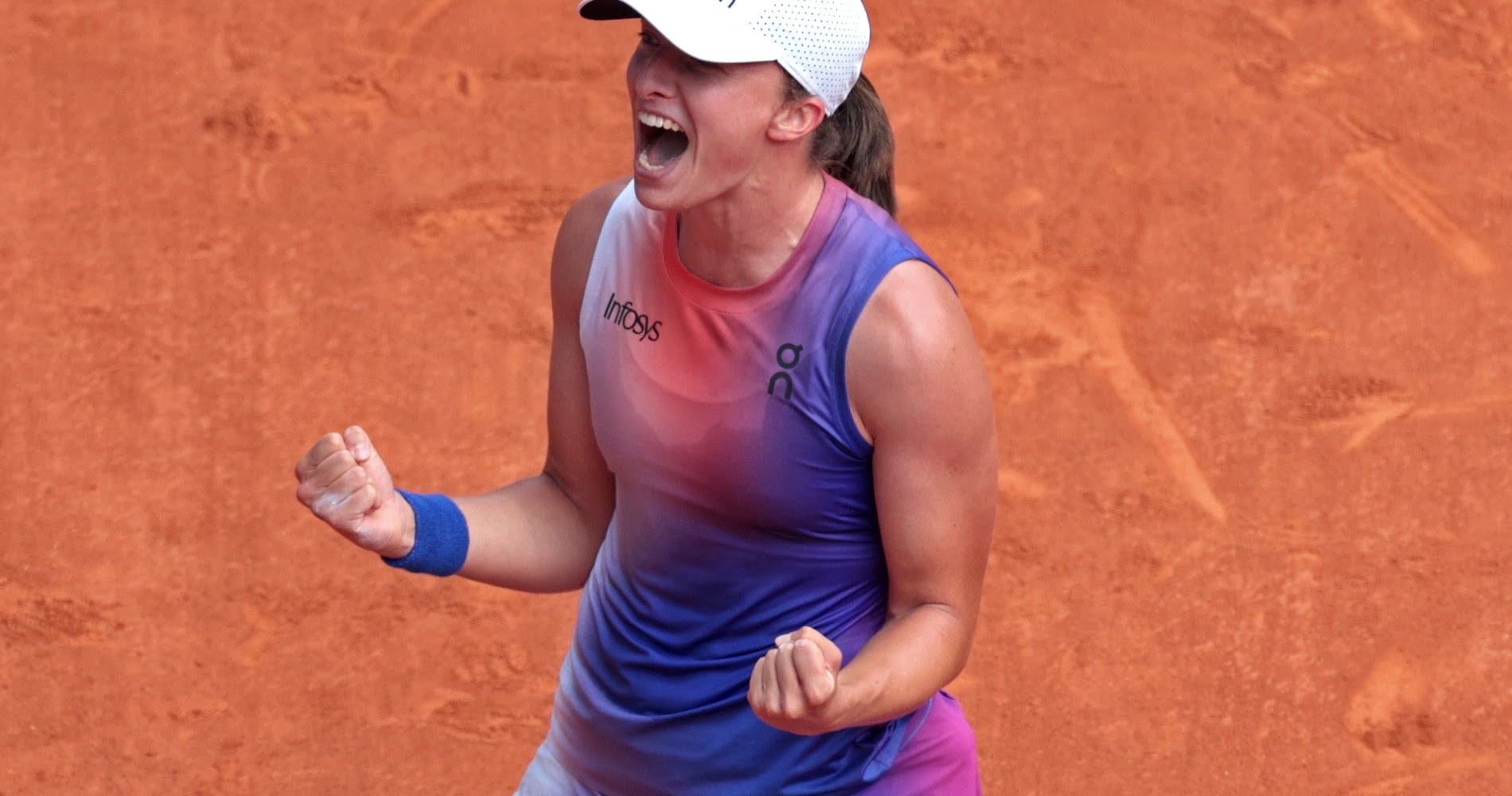
The key to unlock Swiatek’s potential in the ways we’ve seen again in Paris this year was always going to be through her mind. You cannot turn an emotional individual into a cold-blooded winning machine: it’s a myth. Abramowicz doesn’t want to use the word “control” when talking about Swiatek’s emotions, she prefers saying “regulate.”
“The difference between controlling and regulating is that with control you try fight it but with regulating, you find healthy ways in appropriate moments to express your emotions. I was stunned where people asked Iga why did you cry after the Osaka match: it’s completely human because you need to regulate the emotions, and especially emotional people need to do this even more. Some people would scream, get enraged, would cry: it’s life. But it’s especially important with emotional people.”
“with regulating, you find healthy ways in appropriate moments to express your emotions”
That’s surely where the irony is to watch Iga Swiatek destroying the field on the daily like it’s business as usual despite knowing the amount of work she’s putting in order to avoid being overwhelmed. By her own expectations, by what people expect from her, by a world where her generation lives through social media and by a business that has taken a whole other dimension this year. Signing with Lancôme has been a huge deal for Swiatek – “And yet some people say she’s not marketable!”, the mental coach laughs. Yet, it was also a step in the unknown. But after that fourth title in Paris, Abramowicz has the confirmation that her player was ready.
“She found her own path. Actually, it was our huge off-court goal for 2022 to navigate this side of life and career, but not to put everything in order because what does that even mean? For Iga to find her way, to answer questions: do I want to be this, or that, do I want to be a public figure, do I want to be more secluded as a person? What do I want? And my philosophy is to help athletes to navigate these challenges, to educate for sure, encourage them to go and talk to lawyers, accountants, banking people, marketing people, and especially Iga who needs to understand things before she makes any decisions. That was a huge work she did in 2022 and 2023 and I do think it just pays off right now.”
“She found her own path”
We all know players who got lost in the sea of sudden opportunities. Abramowicz know them too and has prepared Swiatek to avoid the traps. “I also saw these examples. I tried to learn from it. I try to understand and predict to give her tools so she can make her decisions based on being confident.” She surely was sure Swiatek’s shoulders could carry all of this nearly from the start, actually. Asked when she thought Swiatek was special, she doesn’t hesitate: “Oh the first minute I met her! I saw the fire. She was all over the place, coming back from school, eating in a rush, trying to do everything at the same time and I was like ‘oh my god what’s going on?’ And then she went on court, locked in, and I was like ‘now we’re talking’.”
Still Swiatek was and remains a challenge. “The challenging thing was to meet her potential. Such a big potential but with not a lot of resources so there was an amount of work to be done. It’s still fascinating because she’s still not a complete tennis player, not a complete athlete, and not a fully mature human being because she’s just 23 as well. It’s fascinating to keep working with Iga.” Will that fifth Grand Slam title send Swiatek to another phase of her career? Is it another turning point? Abramowicz prefers, as always, to stay both feet on the earth. “I don’t look at it that way, I really like to compartmentalise in a way in terms of performance. Obviously we’ll use this experience of also winning Madrid and Rome before Roland-Garros.”
“The losses will come, but the most important thing is something else”
Swiatek keeps being that good because she’s prepared to win in a very holistic approach. Because not a single detail is left to chance. Because she has a team fully aware that they’re not dealing with a super hero but with a young woman having to deal with strong emotions on the daily. So, it’s no surprise that they’re also preparing her for the day the defeat will come again.
“I keep things realistically. My narrative was also like ‘The losses will come. You will eventually lose, maybe in a moment you don’t expect.’ But the most important thing is something else: whether you win or lose, you leave your whole mind, body and heart on court. You need to look at yourself in the mirror and say I did my best. It might not be enough but you did your best so there’s no regrets. Regret is an anchor that keeps us in the past: it’s the if.” There will be no if this time again at Roland-Garros when Iga Swiatek looks back at that 2024 edition. She mastered everything in the best possible way, starting with her own inner storms… as she’s been trained to do for years. The Very Disciplined Wonder.




